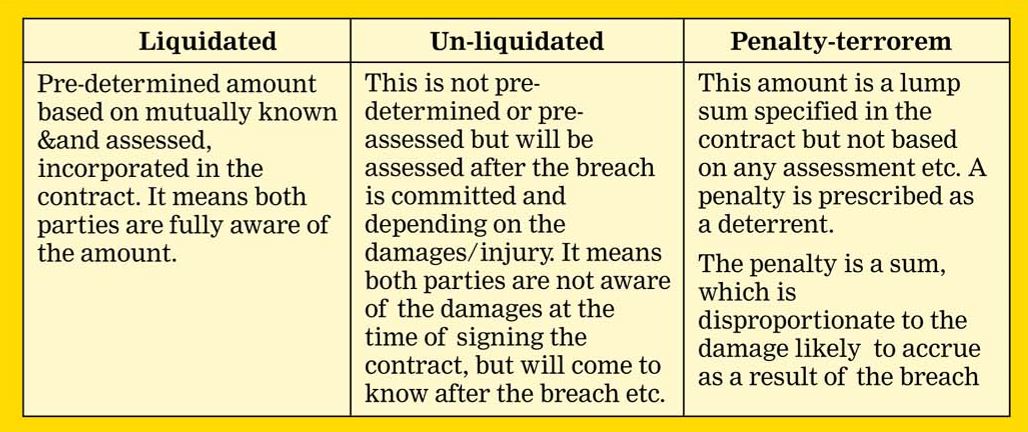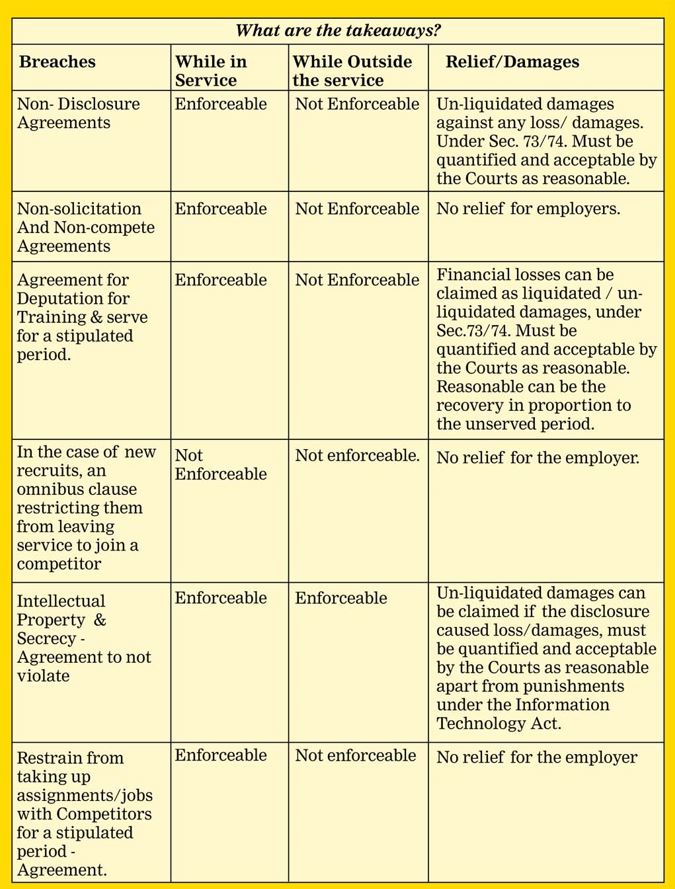|
50,000 HR PROFESSIONALS ARE CONNECTED THROUGH OUR NIRATHANKA HR GROUPS. YOU CAN ALSO JOIN AND PARTICIPATE IN OUR GROUP DISCUSSIONS.
|
|
We do engage people suitable to any position based on technical skills with expertise in the respective area. The engagement is based on an "Employment Contract" normally captioned as Letter of Appointment. The Employment Contracts may be normal ones and may incorporate certain conditions like non-compete, non-solicitation, non-disclosures of technical knowhow, serving the company for a stipulated number of years, if not, to claim un-liquidated or liquidated damages in case of any breach by either party, to safeguard Intellectual Property, etc. Any Employment Contract must stand the test of Law at any time, otherwise, it is a futile one. Hence, it is essential that while drafting an Employment Contract one must keep in mind its enforceability before a Court of Law. Hence, an attempt is being made in this direction to enlighten the professionals in this article.
The Employment Contracts stipulate various terms and conditions as mutually discussed and accepted by the Management and the Employee. Such contracts are "Contracts" as defined under the Indian Contract Act, 1872. According to sec.2(h), a contract is defined as an agreement enforceable before the law.
CONTRACT = AGREEMENT + ENFORCEABILITY BEFORE LAW. AGREEMENT = OFFER + ACCEPTANCE WITH FREE CONSENT. The cardinal principle in the light of the Act, is that the offer and acceptance of an offer must be absolute without giving any room for doubt. The "acceptance" must be devoid of any undue influence, emotional pressures, coercion, etc. An "Agreement" is one in which the offer is accepted. Both Parties are deemed to have fully understood the offer and accepted with free consent. If any one of the three components is lacking, either in the offer or in the acceptance, there cannot be a valid contract. All agreements are not contracts, but all contracts are agreements. Sec.23 stipulates that the "consideration or the object of the Agreement is forbidden by law or Is of such a nature that, if permitted, would defeat the provisions of any law or is fraudulent or Involves or implies, injury to the person or property of another or the court regards it as immoral, or opposed to public policy". Another most important segment in Sec. 23, namely, is "opposed to public policy". What is "public Policy"? In short, it means anything that is against the fundamental rights of either of the parties and/or against any provisions of any Law in force. According to me, most of the litigations before the Courts are mainly centered around "public policy". The enforceability of these types of contracts has been a challenge for the last many decades, with varied judicial pronouncements by various High Courts and Supreme Court. In this Article on this subject, an attempt is made to highlight the complexities and to provide suitable remedial suggestions to overcome such complexities. As we traverse, further, we will discuss this in detail for full understanding. Sec. 27 stipulates that "Every Agreement by which anyone is restrained from exercising a lawful profession, trade or business of any kind, is to that extent void". One needs to read both Sections together to arrive at a broad understanding of "Opposed to Public Policy". In fact, there is no definition of "Pubic Policy" in the Act. Whereas, deep interpretations of the elements in Sec.23 & Sec.27 by the Judiciary provide everyone to understand what is Public Policy and how to ensure the Contract is valid in line with the Act. In simple it can be defined as an agreement that is injurious to the public or is against the interest of the society. An object of an agreement is prohibited under any law like committing crimes; immoral activities etc are all opposed to public policy. Few examples: The intent or the object is held "opposed to public policy". 1. An agreement restraining personal liberty. The relevance may be to guarantee to serve the Employer for a specified number of years and not to take up any employment with other Employers. OR prohibiting taking up any business OR entrepreneurship etc while in employment or after quitting the job. It is a restraint on the personal liberty of a person. 2. An agreement fixing a lower the remuneration just because person is badly in need of employment and hence prepared to agree to any remuneration. Here, the Employer takes advantage of his economic duress which also infers coercion and undue influence. In the case of Cinema Worker's Union Vs Secretary, Karnataka High Court ruled that depriving of minimum wages is unconstitutional. Similarly, in the case of Ranbaxy Lab Vs State of West Bengal, Calcutta High Court held that unreasonable clauses will violate the Constitution. In Deena vs. Union of India, the Supreme Court held that labour taken from prisoners without paying proper remuneration was "forced labour" and violates Art. 23 of the Constitution. The prisoners are entitled to payment of reasonable wages for the work taken from them and the Court is under duty to enforce their claim. 3. An agreement restraining the marriage with an employee in the same organisation. There are instances where if an employee marries another working in the same organisation, one of them shall quit the organisation. The reason behind is "Conflict of interest" but "opposed to public policy". 4. An agreement to deposit all original credentials including passports with the employer till the employee completes a stipulated period of years. Again, this is opposed to public policy. 5. An agreement stipulating that upon discharge or termination as per the terms of agreement not to file any suit or case challenging the termination or discharge. 6. A mutual agreement between two employers prohibiting each other - not to employ the employees from each other. 7. In the case of Bull Vs Pitney Bowes Ltd, in 1966 held that the "Condition which was imposed between the employer & employee, if the employee takes employment with a competitor, his pension benefits would be forfeited" the agreement is void being restraint of trade. The above are some illustrative examples that narrate what is "Public Policy". With the above understanding, let us proceed toward understanding the enforceability of Employment Contracts which are complex in nature. What are the types of Employment Contracts?
1. Contract to serve the Company for a specified number of years for having deputed for special training etc, otherwise the Company shall claim liquidated damages. 2. Contract to serve the Company for a specified number of years and also not to take up any job in any company that is engaged in a similar type of business, otherwise, the Company shall claim liquidated damages or seek any legal remedy. 3. Not to disclose confidential, trade secrets, customer intelligence, costing of a product, etc. to any outsider while in the service and even after leaving the Company, and also to not to join or render services to any other employer who is similar business for a specified period, otherwise, appropriate damages shall be claimed and also resort to any other remedy. 4. Theft or misuse of intellectual property of the Company, resorting to legal options including claiming damages. Enforceability arises from two contingencies. 1. While in the employment of Company. 2. While outside the employment of a Company. Enforceability while in the employment of a Company, all the Courts have held that the Employer is eligible and entitled to appropriate actions/reliefs/damages, etc against the employee for any breach, since the employee is bound by the regulations & service rules of the Company and as such, he is prone to all actions. The actions may be departmental, criminal, or civil in terms of injunctions, claim financial damages, etc. How far the Employer is entitled to enforce against an Employee - while outside the employment of a Company has always been a challenging one. Non-Compete Agreements: Normally, the clauses will be: 1. To serve the Company for a specified number of years for having deputed for special training etc., otherwise for any breach, the Company shall claim liquidated/un-liquidated damages. 2. To serve the Company for a specified number of years and also not to take up any job in any company which is engaged in similar type of business, otherwise for any breach, the Company shall claim liquidated damages/un-liquidated damages/penalty or any legal remedy like injunctions. On close examination of these two clauses, one Can see the following actions to be initiated. a. Claim liquidated/un-liquidated damages/penalty- terrorem. b. Seeking any legal remedy like an injunction against the taking up employment, will be a futile exercise. It is very important to note that clause 1, above, (a), Claim liquidated / un- liquidated damages/penalty- terrorem is not opposed to "Public Policy" since it is not against any personal liberty of a person. Hence, this clause is enforceable in Law, although the employee is outside the employment. Sec.73 of the Act empowers the Party affected by the breach to claim such amount specified in the contract and the Courts, shall, grant a reasonable amount, depending on the facts of the case but not exceeding the amount so specified. Before we proceed, let us understand - Liquidated damages, un-liquidated damages/penalty-terrorem.
The courts shall decide the quantum of damages depending on the facts, circumstances, evidences and more so what the Court considers as reasonable.
In the case of Madhup Chunder v. Rajcoomar Doss (1874) 14 Beng. L.R. 76, in the judgment of Sir Richard Couch, C.J. while interpreting Sec.27 of the Act, namely, and restraint on Trade post-contractual period held that such restraints are against the personal liberty and thus opposed to public policy. This judgment was delivered about 145 years back and till date it remains undisturbed. In the case of Superintendence Co. of India Vs Krishnan-1981 (2) SCC 246, the Supreme Court held that post-service restrictive covenant in restraint of trade as contained in Clause (10) of the service agreement between the parties is void Under Section 27 of the Indian Contract Act. His services were terminated on December 27, 1978 thereafter, he started his firm in the same business as the Company. The Company sought an injunction against Krishnan from carrying on the same business. "Every member of the community is entitled to carry on any trade or business he chooses and, in such manner, as it thinks most desirable in his own interest, so long as he does nothing unlawful." The injunction was not granted. In the case of Ambiance India P. Ltd. v. Naveen Jain Delhi High Court in 2005, held: "An agreement between the parties prohibiting an employee for two years from taking employment with any present or past with a prospective customer of plaintiff was held to be void. In the leading case of Pepsi Food Put Ltd., Vs Bharat Coco Cola Ltd., Delhi High Court held that “………………negative covenant in contract restraining employee from engaging or undertaking employment for twelve months after leaving the services of plaintiff was held to be contrary and in violation of Section 27 of the Indian Contract Act, 1872." In another leading case of American Express Bank Ltd. v. Ms. Priya Malik, (2006) IILLJ 540 DEL, Delhi High Court declined to grant an injunction against Priya Malik from taking up employment with a competitor bank. She was a Branch Manager at American Express Bank. She was assigned very high responsibilities like marketing, customer service, developing market research, etc. She was terminated from services on 10.10.2005 for some reason. In an interesting case before Delhi High Court in the case of Wipro Ltd. v. Beckman Coulter International S.A 2006 (3) ARBLR 118 (Delhi), Wipro sought for a permanent injunction against Beckman Coulter restraining them from employing their employees. In this case, both Parties had entered into an agreement on "Non-Solicitation of Employees". The Court held that the Contract is void. What are the recourses available for an Employer under these circumstances? 1. Since obtaining injunctions is not possible, the actual expenses incurred by the Employer while deputed for training, etc. can be recovered by filing a civil suit before a Civil Court for breach of contract. 2. In addition, against any lump sum amount mentioned in the contract, recovery proceedings may be initiated before a Civil Court in proportion to the balance unserved period. For instance, if it is stipulated in the contract that the employee shall serve for a period of two years, and in case, the employee relinquishes the job in between, the employee undertakes to pay amount of Rs. 2 Lakhs. The employee, after serving, 12 months, leaves the job. Since the employee has served for half of the agreed period, the employer can claim in proportion. In other words, the Employer can claim Rs. One lakh which was held as reasonable. This view has been taken in several cases by various Courts. 3. Further, the Employer can also claim un-liquidated damages; if it is established that arising out of the transmission of technical know-how being passed on to the competitor by the Employee and further that it has resulted in a downward trend in the business leading to damages or losses. Of course, this needs proper assessment and quantification depending on the facts and circumstances. Solicitation may be in terms of inducing an employee to take up assignments with a competitor or to start a parallel business as an entrepreneur and may be engaging in canvassing in the market against the product or services of the company or even canvass for the product of the competitor in the market. In case, an employee indulges in these activities it is dishonesty, cheating, and fraud against the Company. Similarly, the confidentiality, non-disclosure of any data, secrets, technical know-how, market intelligence, disclosure, or wilful negligence in data preservation of the Company including the personal data of employees is all acts of dishonesty, cheating, and fraud against the Company which may lead to heavy business damages. The above indulgences while in employment being more serious, the Law recognises such breaches as injurious and such contracts restraining such activities as valid. In cases of breach, the Employers can seek injunctions from Courts, resort to filing criminal as well as civil suits for prosecutions & and claim damages in case the business is hurt. Hence, such clauses restraining while in employment are enforceable in Law. Now, the question arises in case of such or similar breaches while not in employment wherein similar restrictive clauses in the contract extend to outside the employment also. In the case of American Express Bank Ltd. v. Ms. Priya Malik, (2006) IIILLJ 540 Delhi HC held"........Rights of an employee to seek and search for better employment are not to be curbed by an injunction ………….. Freedom of changing employment for improving service conditions is a vital right of an employee which cannot be restricted or curtailed on the ground that the employee has employer's data and confidential information of customers..........” In the case of Polaris Software Lab. Limited vs. Suren Khiwadkar, (2003) 3 MLJ 557. Madras High Court held “....Mere apprehension of interference with legal right does not entitle the applicant/plaintiff to an injunction." In the case of V.V. Sivaram and others v. FOSECO India Limited, an employee was restrained from using secrets and confidential information, that he gained during his job, even after moving out of the job. Here, the product manufactured was exactly similar and identifiable with the product manufactured by the Respondent. Hence, the court granted an injunction against the petitioner. It is a rare case. In the case of FINANCIAL SOFTWARE AND SYSTEMS Vs MUDASSIR NAIK, 2012, Madras HC while refusing to grant an injunction against poaching the employees to join mPhasis after taking up employment and inducing the team members to join him at mPhasis, held “............No injunction can be granted against an employee after the termination of his employment, restraining him from carrying on a competitive trade. But, however, the case for claiming damages can be pursued........." In the case of Independent News Service Pvt. ... vs Mr. Anuraag Muskaan, Delhi HC allowed a restrictive injunction against the respondent only for a period of two years from 31.12.2005 his date of leaving Independent News Service not to engage insolicitation of employees but refused to grant any injunction against him from joining any competitor. As regards the solicitation already made by the respondent in the advertisement, the petitioner, if it is able to substantiate this in the arbitration proceedings, would be entitled to be compensated by the grant of damages. In the case of Desiccant Rotors International... vs Bappaditya Sarkar & Anron 14 July, 2009, Delhi High Court held"……...The injunction only restrains Defendant No. 1 from approaching the plaintiff's suppliers and customers for soliciting business which is in direct competition with the business of the plaintiff......" but did not grant any injunction against joining the competitor.
What are the precautions to be taken while executing any Employment Contracts?
Penalty in case he breaches the term of serving the Company for a specified number of years.
By:
K. Vittala Rao Legal & Management Consultant and Author of Labour Law Books Courtesy: Business Manager 1st March 2024 Follow HR Learning Academy WhatsApp Channel by clicking the below link: https://whatsapp.com/channel/0029Va4vHVm1CYoX8FwvPZ1h
0 Comments
Leave a Reply. |
HR Learning and Skill Building Academy50,000 HR PROFESSIONALS ARE CONNECTED THROUGH OUR NIRATHANKA HR GROUPS.
YOU CAN ALSO JOIN AND PARTICIPATE IN OUR GROUP DISCUSSIONS. |
site map
SitePUBLICATIONSJob |
HR SERVICESOTHER SERVICESTraining |
POSHNGO & CSROur Other Website:subscribe |
30,000 HR PROFESSIONALS ARE CONNECTED THROUGH OUR NIRATHANKA HR GROUPS.
YOU CAN ALSO JOIN AND PARTICIPATE IN OUR GROUP DISCUSSIONS.
YOU CAN ALSO JOIN AND PARTICIPATE IN OUR GROUP DISCUSSIONS.
Copyright : MHRSPL-2021, website designed and developed by : www.nirutapublications.org.









 RSS Feed
RSS Feed





